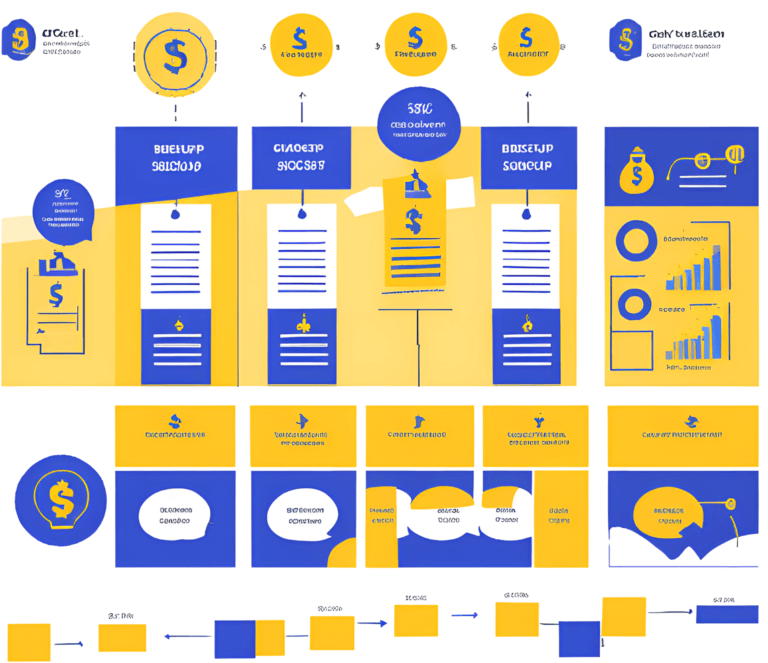Effective resource allocation, well-informed decision-making, and strategic planning are essential for success in the world of startups. Financial modeling is a crucial tool used by entrepreneurs to forecast, assess, and optimize their financial performance. It is at the core of these important responsibilities. We’ll go into great detail in this blog about how financial modeling plays a crucial role in determining how startup endeavors develop.
What is Financial Modeling for Startups?
Starting a business is exciting, but it’s also full of uncertainties. One of the most effective tools entrepreneurs can use to navigate this uncertainty is financial modeling. Essentially, financial modeling involves creating a detailed forecast of your company’s financial future, including expected revenues, costs, and cash flow. It’s the foundation for making informed business decisions.
In the early stages of a startup, having a clear understanding of where the business is heading financially can help founders avoid pitfalls and seize opportunities. In this article, we’ll break down the key benefits of financial modeling and how it can be used to steer a startup toward success.
Why is Financial Modeling Crucial for Startups?
Let’s be honest, starting a business is risky. About 90% of startups fail, often because they run out of money or fail to manage their finances properly. Financial modeling offers a clear plan that helps you avoid these common problems. It’s like having a map when you’re on a road trip; without it, you’re just guessing your way around.
A solid financial model provides insight into your cash flow, profitability, and future growth, and it can guide you in making smarter decisions, whether you’re planning for rapid expansion or managing lean operations.
Key Benefits of Financial Modeling for Startups:
- Clear Financial Roadmap: It gives you a structured plan on how you’ll make money, spend it, and ensure there’s enough left to grow.
- Helps Avoid Common Pitfalls: By forecasting various financial scenarios, you can foresee issues like running out of cash and prepare for them.
Strategic Planning and Goal Setting with Financial Models
A successful startup needs a clear strategy. Financial modeling helps you set realistic goals based on your company’s actual financial situation. Whether you’re planning to scale or trying to break even, a good financial model aligns your strategy with achievable targets.
For example, if you’re setting revenue goals, your model can show whether you’re on track or if you need to tweak your marketing spend or pricing strategy. Instead of chasing lofty, ungrounded dreams, you’re building a business based on data and realistic projections.
How Financial Models Support Goal Setting:
- Set Measurable Milestones: You’ll know exactly what you need to achieve each month or quarter to stay on track.
- Long-term Focus: Rather than getting bogged down in daily challenges, you can ensure that everything is working towards your bigger, long-term vision.
Resource Allocation and Capital Optimization
Money is tight when you’re starting out. Every dollar has to count, and financial modeling helps you figure out where your limited resources will have the most impact. It’s not just about avoiding waste, it’s about making strategic decisions that give you the highest return on investment (ROI).
For instance, your model might show that investing in marketing yields higher customer acquisition rates than hiring additional staff. This kind of insight helps you focus on initiatives that drive growth while keeping an eye on your cash flow.
Key Metrics for Effective Resource Allocation:
- Profitability Projections: Know which revenue streams are most profitable and allocate resources accordingly.
- Cash Flow Management: Ensure you have enough liquidity to cover your expenses and plan for future investments.
- ROI Calculation: Understand which initiatives offer the best return on investment.
Using Financial Models to Attract Investors
All founders always worried about how venture capitalist evaluate a startups.
Securing funding is a top priority for many startups. But investors or Venture Capitalists want to know that their money is being used wisely, and financial modeling can help build their confidence. A detailed financial model gives investors a clear picture of your business’s potential, your expected growth, and how you plan to use their funds to achieve that growth.
When pitching to investors, including a robust financial model can demonstrate your preparedness and business acumen. It helps them see that you’ve thought through every aspect of your business and reduces their perceived risk in investing.
Why Investors Care About Financial Models:
- Demonstrates Market Potential: Your financial model shows how you plan to capture market share and generate revenue.
- Mitigates Risk: Investors see that you’ve accounted for risks and have a plan to navigate them.
- Essential for Pitch Decks: Including financial forecasts in your pitch deck is crucial for convincing investors that your startup is worth their time and money.
Risk Management and Scenario Planning for Startups
Let’s face it, nothing ever goes exactly as planned. But a good financial model can help you prepare for different scenarios. Scenario planning allows you to run best-case, worst-case, and moderate-case scenarios, helping you prepare for the unexpected.
For example, what happens if your sales double? Can your current infrastructure handle it? Or what if you lose a major client? Can you survive the hit? By running these scenarios in your model, you can develop contingency plans to deal with any situation that arises.
Key Aspects of Scenario Planning:
- Best-case vs. Worst-case Scenarios: Know how different outcomes can impact your business, from booming sales to unexpected costs.
- Mitigating Risks: Having a clear understanding of risks allows you to create strategies for minimizing their impact.
Performance Monitoring and Decision Support
A financial model isn’t something you create once and forget about. It’s a dynamic tool that needs regular updates as your business evolves. By comparing actual performance to your projections, you can adjust your strategy in real-time to stay on course.
For example, if your expenses are higher than forecasted, you can identify where the overrun is coming from and make cuts before it affects your cash flow. This proactive approach keeps you in control of your business’s financial health.
How Financial Models Aid Decision Making:
- Benchmarking Progress: You’ll know how your actual performance compares to what you projected, allowing you to make timely adjustments.
- Data-Driven Decisions: Financial models give you the information you need to make smarter, more informed decisions.
How to Create an Effective Financial Model for Startups
Effective resource allocation, well-informed decision-making, and strategic planning are essential for success in the world of startups. Financial modeling is a crucial tool used by entrepreneurs to forecast, assess, and optimize their financial performance. It is at the core of these important responsibilities. We’ll go into great detail in this blog about how financial modeling plays a crucial role in determining how startup endeavors develop.
Resource Allocation and Capital Optimization
Money is tight when you’re starting out. Every dollar has to count, and financial modeling helps you figure out where your limited resources will have the most impact. It’s not just about avoiding waste, it’s about making strategic decisions that give you the highest return on investment (ROI).
For instance, your model might show that investing in marketing yields higher customer acquisition rates than hiring additional staff. This kind of insight helps you focus on initiatives that drive growth while keeping an eye on your cash flow.
Key Metrics for Effective Resource Allocation:
- Profitability Projections: Know which revenue streams are most profitable and allocate resources accordingly.
- Cash Flow Management: Ensure you have enough liquidity to cover your expenses and plan for future investments.
- ROI Calculation: Understand which initiatives offer the best return on investment.
Using Financial Models to Attract Investors
Securing funding is a top priority for many startups. But investors want to know that their money is being used wisely, and financial modeling can help build their confidence. A detailed financial model gives investors a clear picture of your business’s potential, your expected growth, and how you plan to use their funds to achieve that growth.
When pitching to investors, including a robust financial model can demonstrate your preparedness and business acumen. It helps them see that you’ve thought through every aspect of your business and reduces their perceived risk in investing.
Why Investors Care About Financial Models:
- Demonstrates Market Potential: Your financial model shows how you plan to capture market share and generate revenue.
- Mitigates Risk: Investors see that you’ve accounted for risks and have a plan to navigate them.
- Essential for Pitch Decks: Including financial forecasts in your pitch deck is crucial for convincing investors that your startup is worth their time and money.
Risk Management and Scenario Planning for Startups
Let’s face it, nothing ever goes exactly as planned. But a good financial model can help you prepare for different scenarios. Scenario planning allows you to run best-case, worst-case, and moderate-case scenarios, helping you prepare for the unexpected.
For example, what happens if your sales double? Can your current infrastructure handle it? Or what if you lose a major client? Can you survive the hit? By running these scenarios in your model, you can develop contingency plans to deal with any situation that arises.
Key Aspects of Scenario Planning:
- Best-case vs. Worst-case Scenarios: Know how different outcomes can impact your business, from booming sales to unexpected costs.
- Mitigating Risks: Having a clear understanding of risks allows you to create strategies for minimizing their impact.
Performance Monitoring and Decision Support
A financial model isn’t something you create once and forget about. It’s a dynamic tool that needs regular updates as your business evolves. By comparing actual performance to your projections, you can adjust your strategy in real-time to stay on course.
For example, if your expenses are higher than forecasted, you can identify where the overrun is coming from and make cuts before it affects your cash flow. This proactive approach keeps you in control of your business’s financial health.
How Financial Models Aid Decision Making:
- Benchmarking Progress: You’ll know how your actual performance compares to what you projected, allowing you to make timely adjustments.
- Data-Driven Decisions: Financial models give you the information you need to make smarter, more informed decisions.
How to Create an Effective Financial Model for Startups
Creating a financial model may sound intimidating, but it doesn’t have to be. Here’s a step-by-step guide to help you get started.
Steps to Build a Solid Financial Model:
- Start with Your Assumptions: Make sure your assumptions are based on realistic data, such as customer acquisition costs, pricing strategies, and market size.
- Project Revenue and Costs: Estimate how much money you’ll bring in and how much you’ll spend over a given period.
- Incorporate Key Financial Statements: Include an income statement, balance sheet, and cash flow statement to give a comprehensive financial view.
- Run Multiple Scenarios: As discussed earlier, don’t just rely on a single projection. Running multiple scenarios ensures that you’re prepared for different outcomes.
- Use Financial Tools: While Excel is a popular choice, there are also financial modeling software options like LivePlan or Causal that can simplify the process.
Fuel Your Startup’s Growth with Excel Business Resource
Just as a well-organized cap table is vital for your startup’s financial foundation, selecting the right startup advisor is crucial for driving your business forward. That’s where we come in. At Excel Business Resource, we provide a comprehensive range of services tailored to the unique challenges of your growing startup. Much like your cap table adapts as your company scales, our Financial Forecasting Models are designed to evolve with your business, ensuring you stay ahead at every stage of growth.
Conclusion: Leveraging Financial Modeling for Long-term Success
In today’s competitive startup landscape, having a financial model isn’t just a nice-to-have—it’s a necessity. It helps founders make data-driven decisions, manage risks, allocate resources effectively, and attract investors. More than just a spreadsheet, it’s a powerful tool that can guide your startup from day one and scale as your business grows.
If you’re a founder looking to take control of your business’s financial future, now’s the time to invest in financial modeling. Whether you build it yourself or hire a professional, having a solid financial model can mean the difference between failure and long-term success.







